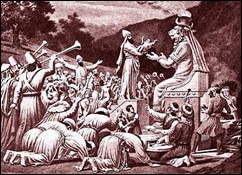THE MESSAGE OF 2 THESSALONIANS.
A Commentary by John Stott.
2 Thessalonians 3:1-18. The responsibility of Christians.
Paul has been peering into the future. He has foreseen and foretold both the revelation of Christ on the last day and the rebellion of Antichrist which will precede and herald it. He has also indicated that meanwhile, although the final outbreak of lawlessness is being restrained, yet ‘the secret power of lawlessness is already at work’ in the world (2 Thess. 2:7). In this ambiguous situation, in which evil is both operative and held in check, what is the responsibility of Christian people? How should we behave, in view of the present tension and the final denouement?
1. Introduction: the centrality of the word.
The apostle’s answer concerns divine revelation. During the interim period between the two comings of Christ, while he is absent from the world , God has not left his people without a guiding light or a compass. On the contrary, he has given us both in Scripture. Already in chapter 2 Paul has written about the importance of believing the truth (2:1, 10-12) and holding fast to his teachings (2:13). Now in chapter 3 this becomes his preoccupation. He uses two expressions (*logos* and *paradosis*, ‘word’ and ‘tradition’) which, while not identical, overlap one another to a considerable extent, since both denote revealed truth.
The phrase *the message of the Lord* in 3:1 (literally ‘the word of the Lord’) has already occurred in 1 Thessalonians 1:8. There Paul says that it ‘rang out’; here he longs that it may ‘spread rapidly’. In both cases he is referring to the propagation of the gospel. And in both cases too he is careful to define the gospel as ‘the Lord’s message’. Although it had been entrusted to him (1 Thess.2:4), it had not originated with him, but with God. He knew this. So did the Thessalonians, for they had welcomed it ‘not as the word of men, but as it actually is, the word of God’ which was effectively at work in believers (1 Thess.2:13).
The other word the apostle uses in this chapter is *paradosis* (‘tradition’), that is to say, teaching which he had received, and passed on (6, cf. 2;15). Now the mere mention of the word ‘tradition’ is enough to raise a question in the minds of Protestants, who affirm the supremacy of Scripture and are resolved to subordinate tradition to it. Did not Jesus himself reject ‘the traditions of the elders’, in order that ‘the word of God’ might take precedence? (Mk.7:13). How then could Paul exalt what Jesus had abased? The answer must be that they were referring to different traditions, which had different origins. The Jewish oral traditions which Jesus rejected he called ‘the traditions of men’, whereas the traditions or teachings of the apostles had a divine origin. ‘It is no contradiction’, wrote Friedrich Buchsel, ‘that Jesus repudiates tradition and Paul champions it. Paul’s tradition agrees with Jesus’ rejection, since they are both opposed to human tradition’.
———————————————————-
Tomorrow: 2 Thessalonians 3:1-18. The responsibility of Christians (continued).
 Siete Maneras de Orar Por Su Vida de Oración
Siete Maneras de Orar Por Su Vida de Oración 




